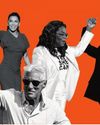
Like many people, I find that stress transforms me into a nasty combination of Oscar the Grouch and Scrooge McDuck. The more pressure I am under, the more irritable I feel - and the less generous I become. I partly blame our culture. I've read enough wellness advice to know that I need to prioritise my own needs over other people's. And so, when I feel under pressure, I have often made it a habit to practise small indulgences aimed at restoring my mental equilibrium, while insulating myself from all but the most essential social commitments.
Having read the latest psychological research, I can't help but wonder if this attitude only exacerbates my bad mood. A wealth of new studies has shown that being kind to others is often the most effective means of suppressing the physiological and psychological stress response. Whether we are giving our time to a charity, "paying it forward" in a coffee shop, or providing emotional succour to a friend in need, altruism can boost our wellbeing in ways that we simply do not experience from treating ourselves. Other-care, it seems, is often one of the best forms of self-care.
My interest as a science writer was first piqued by a series of papers examining the surprising vitality of volunteers. Over hundreds of studies, scientists have found that engaging in unpaid work for the good of others brings a notable boost to wellbeing. These include a greater sense of meaning and purpose, more self-esteem, higher overall life satisfaction and reduced risk of depression. It even seems to reduce the risk of death. "The effect on mortality really stands out," said Beth Nichol, an associate lecturer at Northumbria University and lead author of a recent scientific review summarising the evidence.
This story is from the {{IssueName}} edition of {{MagazineName}}.
Start your 7-day Magzter GOLD free trial to access thousands of curated premium stories, and 9,000+ magazines and newspapers.
Already a subscriber ? Sign In
This story is from the {{IssueName}} edition of {{MagazineName}}.
Start your 7-day Magzter GOLD free trial to access thousands of curated premium stories, and 9,000+ magazines and newspapers.
Already a subscriber? Sign In

Friendship interrupted
They were best mates. Then one had a baby, while the other struggled to conceive. They share their brutally honest takes on what happens when motherhood affects friendship

KERNELS OF HOPE
During the siege of Leningrad, botanists in charge of an irreplaceable seed collection, the first of its kind, had to protect it from fire, rodents-and hunger

A new horizon' The inverse link between cancer and dementia
Scientists have long been aware of a curious connection between these common and feared diseases. At last, a clearer picture is emerging

Across the universe
Samantha Harvey won the Booker prize with a novel set in space. Yet, she says, Orbital is actually 'a celebration of Earth's beauty with a pang of loss'

Frank Auerbach 1931 -2024
Saved from the Holocaust, this artist captured the devastation of postwar Britain as ifits wounds were his own but he ultimately found salvation in painting

Seven lessons I've learned after 28 years as economics editor
Margaret Thatcher was Britain's prime minister and Neil Kinnock was leader of the Labour party.

Droughtstricken dam leaves economies powerless
A ll is not well with the waters of Lake Kariba, the world's human-made lake largest A punishing drought has drained the huge reservoir close to record lows, raising the prospect that the Kariba Dam, which powers the economies of Zambia and Zimbabwe, may have to shut down for the first time in its 65-year history.

Let this be the end of these excruciating celebrity endorsements
I wish celebrities would learn the art of the French exit. But they can't, which is why Eva Longoria has announced she no longer lives in America. \"I get to escape and go somewhere,\" she explained.

Alive, but unable to thrive under absolute patriarchy
Since the Taliban returned to power, women and girls have tried defiance, but despair at their harshly restricted lives

‘It's tragic’ Reflection in the wake of Amsterdam violence
Carrying signs scrawled with messages urging unity, they laid white roses at the statue of Anne Frank, steps away from the home where her family had hidden from Nazi persecution.